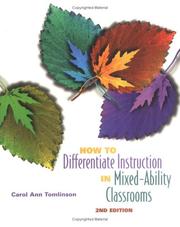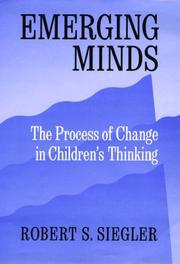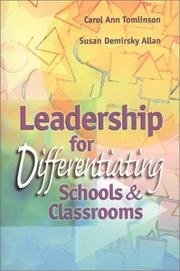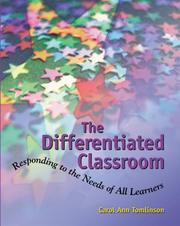| Listing 1 - 10 of 10 |
Sort by
|
Book
ISBN: 1575424169 9781575424163 Year: 2012 Publisher: Minneapolis, MN : Free Spirit Publishing,
Abstract | Keywords | Export | Availability | Bookmark
 Loading...
Loading...Choose an application
- Reference Manager
- EndNote
- RefWorks (Direct export to RefWorks)
"In this updated edition of the popular and trusted guide, Diane Heacox provides a practical introduction to differentiation and explains how to differentiate instruction in a wide range of settings to provide variety and challenge in how teachers teach and in how students learn. Individual chapters focus on evaluation in a differentiated classroom and how to manage both behavior and work tasks. The author describes ways to get to know students and recognize that all have strengths and limitations. Templates and forms simplify planning; examples illustrate differentiation in many content areas. The book is refreshed throughout to reflect today's most effective practices in curriculum design and instructional methods. New features include connections to Common Core State Standards, revised information on multiple intelligences, updated bibliography and resources, and a PowerPoint presentation for use in staff training and professional development. The accompanying CD-ROM provides the PowerPoint and all of the reproducible forms from the book along with further examples of curriculum maps, workcards, and matrix plans. Teachers can print out what they need, when they need it, and can customize forms for their own classrooms and students"--
Dissertation
Year: 2013 Publisher: Liège Université de Liège (ULiège)
Abstract | Keywords | Export | Availability | Bookmark
 Loading...
Loading...Choose an application
- Reference Manager
- EndNote
- RefWorks (Direct export to RefWorks)
La dyscalculie développementale est un trouble spécifique des compétences numériques et des habiletés arithmétiques, se manifestant chez des enfants d’intelligence normale et qui ne présentent pas de déficit neurologique acquis (Temple, 1992). Ce trouble des mathématiques touche entre 5 et 7% des enfants scolarisés. Différentes classifications ont été mises en évidence. Les compétences numériques peuvent être classées en deux sous-catégories: une première capacité à manipuler les nombres approximativement, nous partagerions celle-ci avec les êtres vivants dépourvus de langage tels que les animaux. La deuxième capacité arithmétique avancée reposerait sur une notation arithmétique symbolique et sur l’apprentissage d’algorithmes de calcul exact (Dehaene, 1997). La perception des petites numérosités semble présente chez les jeunes enfants, ainsi les sujets perçoivent la différence de numérosité grâce à une augmentation du niveau d’attention lors du changement de numérosité (Starkey et Cooper, 1980). Notre hypothèse de base est de voir si l’estimation correspond à un facteur prédicteur des compétences mathématiques chez les enfants de première année primaire. Pour effectuer ce travail, nous avons dans un premier temps testé des enfants de première année primaire dans le but de créer des groupes de sujets selon leurs capacités mathématiques. Nous travaillons sur trois groupes, à savoir les enfants faibles et moyens en mathématiques ainsi que les enfants contrôles. La deuxième étape de ce projet est de présenter, aux enfants des trois groupes, un testing permettant d’évaluer d’autres capacités cognitives telles que l’estimation, la mémoire, l’attention, le langage écrit,… Les résultats de notre étude nous ont permis de montrer de nombreux effets significatifs. En effet, nous pouvons conclure qu’il existe un lien entre les capacités d’estimation et les prérequis en mathématiques chez les enfants de 1ère année primaire. De plus, nous pouvons appuyer la présence d’un lien entre la précision des représentations numériques et les capacités intellectuelles et attentionnelles.
Book
ISBN: 2744500658 9782744500657 Year: 2000 Volume: *4 Publisher: Paris: De Boeck,
Abstract | Keywords | Export | Availability | Bookmark
 Loading...
Loading...Choose an application
- Reference Manager
- EndNote
- RefWorks (Direct export to RefWorks)
Un ouvrage synthétique et pédagogique sur le développement de la pensée de l'enfant. Il propose un nouveau modèle de compréhension du processus de changement dans les modes de pensée de l'enfant et montre l'intérêt d'une perspective évolutionniste, qui s'inspire du modèle biologique de l'évolution, pour comprendre les variations interindividuelles, l'adaptation à un monde en changement...
Kinderpsychologie --- Ontwikkelingspsychologie --- Psychologie de l'enfant --- Psychologie du développement --- Cognition in children --- Cognitive styles in children --- Human information processing in children --- Cognition chez l'enfant --- Styles cognitifs chez l'enfant --- Information, Traitement de l', chez l'enfant
Book
ISBN: 9782100754397 Year: 2016 Publisher: Malakoff : Dunod,
Abstract | Keywords | Export | Availability | Bookmark
 Loading...
Loading...Choose an application
- Reference Manager
- EndNote
- RefWorks (Direct export to RefWorks)
Un guide à destination des professionnels de l'accueil de la petite enfance afin de stimuler l'imaginaire des enfants. Une difficulté d'accès à l'imaginaire pour l'enfant a pour conséquences des troubles de l'apprentissage ou du sommeil.
Imagination chez l'enfant --- Imaginaire (psychanalyse) --- Styles cognitifs chez l'enfant --- Cognition chez l'enfant --- Imagination --- Cognition in children --- Cognitive styles in children --- Imagination in children --- Child psychotherapy --- Enfants --- Psychothérapie --- Psychothérapie --- Styles cognitifs --- Cognition --- Chez l'enfant. --- Imagination.

ISBN: 9780871205124 0871205122 Year: 2001 Publisher: Alexandria, Va. : Association for Supervision and Curriculum Development,
Abstract | Keywords | Export | Availability | Bookmark
 Loading...
Loading...Choose an application
- Reference Manager
- EndNote
- RefWorks (Direct export to RefWorks)
Book
ISBN: 2894615892 Year: 2004 Publisher: Montréal : Chenelière/McGraw-Hill,
Abstract | Keywords | Export | Availability | Bookmark
 Loading...
Loading...Choose an application
- Reference Manager
- EndNote
- RefWorks (Direct export to RefWorks)

ISBN: 0195077873 Year: 1996 Publisher: Oxford Oxford University Press
Abstract | Keywords | Export | Availability | Bookmark
 Loading...
Loading...Choose an application
- Reference Manager
- EndNote
- RefWorks (Direct export to RefWorks)
Cognition in children. --- Cognitive styles in children --- Human information processing in children. --- Cognition chez l'enfant --- Styles cognitifs chez l'enfant --- Information, Traitement de l', chez l'enfant --- #PEDA *P 4.037 --- Cognition in children --- Human information processing in children --- Human information processing (Child psychology) --- Information processing in children --- Child psychology --- Cognition (Child psychology) --- Thought and thinking in children

ISBN: 9780871205025 0871205025 1280931078 1416601023 0871209233 9786610931071 0871207249 9780871207241 9781416601029 9781280931079 1416612475 Year: 2000 Publisher: Alexandria, Va. : Association for Supervision and Curriculum Development,
Abstract | Keywords | Export | Availability | Bookmark
 Loading...
Loading...Choose an application
- Reference Manager
- EndNote
- RefWorks (Direct export to RefWorks)
Try going a week without hearing a call for a massive overhaul of our educational system. Parents, students, educators, bureaucrats, pundits . . . everyone says something must be done. But what? And who should do it?In this environment, school leaders must build bridges for change. As the system now stands, many students spend great portions of their lives feeling inferior if they struggle, invisible if they already know the material, problematic if they're not a child of the dominant culture, and perverse if they question the school agenda.This book explores how school leaders can develop responsive, personalized, and differentiated classrooms. Differentiation is simply a teacher attending to the learning needs of a particular student or small group of students, rather than teaching a class as though all individuals in it were basically alike.Expert educators teach individuals the most important things in the most effective ways. No single approach works with all students. Classrooms function best when teachers and students join to develop multiple avenues to learning. Until every student is growing and successful, our own growth is unfinished. The authors show how school leaders can encourage and support growth in our classrooms.
Individualized instruction. --- Cognitive styles in children --- Educational leadership. --- Classroom management. --- School environment. --- Enseignement individualisé --- Styles cognitifs chez l'enfant --- Leadership en éducation --- Classes (Education) --- Milieu scolaire --- Conduite --- Differentiation (Education) --- Individual instruction --- Tutors and tutoring --- Individualized education programs --- Mastery learning --- Open plan schools --- Environment, School --- Educational sociology --- School discipline --- School management and organization --- Teaching --- College leadership --- Education leadership --- School leadership --- Leadership
Book
ISBN: 9782804161958 2804161951 Year: 2010 Volume: *58 Publisher: Bruxelles: De Boeck,
Abstract | Keywords | Export | Availability | Bookmark
 Loading...
Loading...Choose an application
- Reference Manager
- EndNote
- RefWorks (Direct export to RefWorks)
School integration. --- Cognitive styles in children. --- Children with disabilities --- Learning, Psychology of. --- Effective teaching. --- Learning disabilities. --- Learning disabled children --- Student adjustment --- Déségrégation en éducation --- Styles cognitifs chez l'enfant --- Enfants handicapés --- Psychologie de l'apprentissage --- Enseignement efficace --- Troubles de l'apprentissage --- Enfants en difficulté d'apprentissage --- Adaptation scolaire --- Education. --- Education --- Dyscalculia --- Dyslexie --- Trouble de l'attention avec hyperactivité --- Autisme --- Déségrégation en éducation --- Enfants handicapés --- Enfants en difficulté d'apprentissage --- Student adjustment.

ISBN: 9780871203427 0871203421 Year: 1999 Publisher: Alexandria, Va. : Association for Supervision and Curriculum Development,
Abstract | Keywords | Export | Availability | Bookmark
 Loading...
Loading...Choose an application
- Reference Manager
- EndNote
- RefWorks (Direct export to RefWorks)
Individualized instruction. --- Cognitive styles in children. --- Mixed ability grouping in education. --- Classroom management --- Enseignement individualisé --- Styles cognitifs chez l'enfant --- Groupement hétérogène (Education) --- Classes (Education) --- Conduite --- #SBIB:316.334.1O440 --- Onderwijsgedrag: algemeen --- Enseignement individualisé --- Groupement hétérogène (Education) --- Cognitive styles in children --- Individualized instruction --- Mixed ability grouping in education --- Ability grouping in education --- Differentiation (Education) --- Individual instruction --- Tutors and tutoring --- Individualized education programs --- Mastery learning --- Open plan schools --- Child psychology
| Listing 1 - 10 of 10 |
Sort by
|

 Search
Search Feedback
Feedback About UniCat
About UniCat  Help
Help News
News